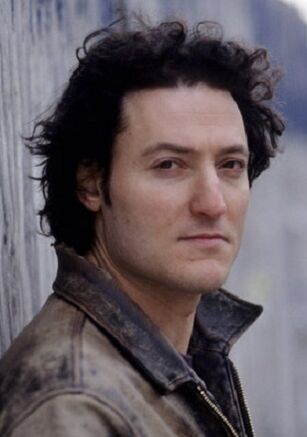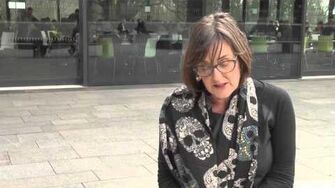
Tobias Hill. Courtesy Goodreads.
Tobias Hill (born 30 March 1970) is an English poet, essayist, novelist. and writer of short stories.
Life[]
Family, youth, education[]
Hill was born in Kentish Town, in North London, to parents of German Jewish and English extraction: his maternal grandfather was the brother of Gottfried Bermann, confidant of Thomas Mann and, as owner of S. Fischer Verlag, German literature's leading publisher-in-exile during the Second World War.[1]
Hill was educated at Hampstead School and Sussex University before spending 2 years teaching in Japan.[2]
Hill has held writing residencies at Newnham College, Cambridge, Sussex University, and Eton College.[3] In 1999 he was the inaugural Poet in Residence at London Zoo.[4] In 2009 he became inaugural Programme Director of the Faber Academy.[5] In 2012 he was appointed as Senior Lecturer on the M.A. creative writing Course at Oxford Brookes University.[6]
Hill's early work appeared in magazines such as Envoi and The Frogmore Papers. He has also written for The Times, The Observer, The Independent, The Guardian and Time Out. From 1998 to 2001, he was rock critic for the Sunday Telegraph.
He has edited the works of other writers, including Edgar Allan Poe.[7]
In 2012, Hill, along with Brooke Magnanti, acted as a judge for Fleeting Magazine's Six-Word Short Story Prize.[8]
He lives in Cricklewood, north London.
Writing[]
Amongst contemporary British authors, Hill is unusual in achieving recognition as a poet, a novelist and a writer of short stories. His novels have been published worldwide.
Hill has also written a book for children, The Lion Who Ate Everything, illustrated by Michael Foreman (twice winner of the Kate Greenaway Medal).
[]
Poetry[]
Hill has published 4 collections,Year of the Dog (1995), Midnight in the City of Clocks (1996) (influenced by his experience of life in Japan) Zoo (1998) and Nocturne in Chrome & Sunset Yellow (2006). The last of these was described by The Guardian as "A vital, luminous collection... it is rare to come across a collection of poetry that you know with certainty you will still be reading years from now, but for me, this is such a book." [9]
Novels[]
In 1999, Hill published his debut novel, Underground. Set on the London Underground, this dark, neo-gothic work follows the story of Casimir, a Polish immigrant, as he comes to terms with his personal and national past. Underground won the Betty Trask Prize and the Arts Council Writer's Award.
The Love of Stones (2001), Hill's 2nd novel, garnered wider recognition: it charts the lives of a pair of 19th-century Jewish brothers and a contemporary protagonist, Katharine Sterne, whose stories are entwined with that of a long-lost jewel, known as "The Three Brothers", once owned by Elizabeth I.[10]
Hill's 3rd novel, The Cryptographer, was published in 2003. A sparer narrative than The Love of Stones, it tells the story of a global financial disaster, examining issues of trust and secrecy. The Cryptographer is set in the near future, but comprises a shadow portrait of the enigmatic historical figure John Law. In December 2003 the Hay Festival showcased the novel as its Book of the Year. It was described by the author A. S. Byatt as evidence of "one of the two or three most original and interesting young novelists working in Britain today".[11]
Hill's 4th novel, The Hidden, was published to acclaim in January 2009. In the Guardian, author James Lasdun called it "an elaborate mystery along the lines of The Magus or The Secret History, and a sustained meditation on the special ethics of terrorism in ancient and modern times...You don't often see writing as lively as this."[12] Author Kamila Shamsie wrote in The Observer: "Apart from everything else that this novel is — a beautifully paced thriller, a meditation on loss, guilt, obsession — it is also one of the finest novels written so far about this, our age of terror."[13]
Themes[]
Secrecy, revelation and obsession are recurrent themes in Hill's fiction. In Skin, a worker at London Zoo investigates the disappearance of dead animals at the hands of an eerie figure, the Featherman, finally discovering his formalin-drenched lair in Camden Town's derelict stable-yards.[14] In Underground, Casimir's physical explorations of London's subterranea echo his mental rediscovery of a traumatic childhood in Poland. In The Love of Stones, Katharine Sterne devotes her life to a search for a legendary lost jewel, the Three Brethren. The same motifs are used to powerful effect in The Hidden, and indeed the novel is prefaced with a quotation from John Dalberg-Acton, 1st Baron Acton: "Every thing secret degenerates".
Recognition[]
Hill's awards include an Eric Gregory Award in 1995, the Ian St James Award in 1997, and the PEN/Macmillan Silver Pen Award in 1997. He was shortlisted for the Mail on Sunday/John Llewellyn Rhys Prize in 2002 and 2004, and for the Sunday Times Young Writer of the Year Award in 2004.
Hill's collection of short stories, Skin (1997), was serialized on BBC Radio 4, was shortlisted for the 1998 John Llewellyn Rhys/Mail on Sunday Prize, and won the International PEN/Macmillan Silver Pen Award.
In 2003 he was nominated as 1 of the best young writers in Britain by the Times Literary Supplement. In 2004 he was selected as 1 of the country's Next Generation poets.
Publications[]
Poetry[]
- Year of the Dog, National Poetry Foundation, 1995
- Midnight in the City of Clocks, Oxford University Press, 1996
- Zoo. Oxford, UK, & New York: Oxford University Press, 1998; Cambridge, UK: Salt Publishing, 2007.
- Nocturne in Chrome & Sunset Yellow. Cambridge, UK: Salt Publishing, 2006.
Novels[]
- Underground, Faber and Faber, 1999
- The Love of Stones. London: Faber & Faber, 2001; New York: Picador USA, 2002.
- The Cryptographer. London: Faber & Faber, 2003.
- The Hidden. London: Faber & Faber, 2009; New York: Harper Perennial, 2009.
Short fiction[]
- Skin. London: Faber & Faber, 1997.
Juvenile[]
- The Lion Who Ate Everything (illustrated by Michael Foreman). London: Walker, 2008.

Isobel Brown reads the poem 'April' by Tobias Hill
Exccept where noted, bibliographical information courtesy WorldCat.[15]
See also[]
References[]
Notes[]
- ↑ Time article
- ↑ http://www.saltpublishing.com/writers/profile.php?recordID=208232
- ↑ [1]
- ↑ Poetry Society
- ↑ Faber
- ↑ [2]
- ↑ Amazon
- ↑ http://www.fleetingmagazine.com/the-six-word-story-prize/
- ↑ [3]
- ↑ The jewel is not a fiction. Queen Elizabeth is shown wearing it in the "Ermine Portrait"; see Portraiture of Elizabeth I of England.
- ↑ Guardian article from Dec 2004, Tobias Hill's poetry workshop
- ↑ Guardian article
- ↑ Guardian article
- ↑ http://findarticles.com/p/articles/mi_qa3724/is_199706/ai_n8779645
- ↑ Search results = au:Tobias Hill, WorldCat, OCLC Online Computer Library Center Inc. Web, Jan. 19, 2014.
External links[]
- Prose
- Books
- Tobias Hill at Amazon.com
- About
- Tobias Hill at Faber & Faber
- Tobias Hill at Salt Publishing
- Tobias Hill at the British Council
- Tobias Hill: Secrets and revelations, interview at Dark Scribe Magazine
- A review of The Hidden from The Oxonian Review
- review of The HIdden. Salon magazine 1 November 2009
|